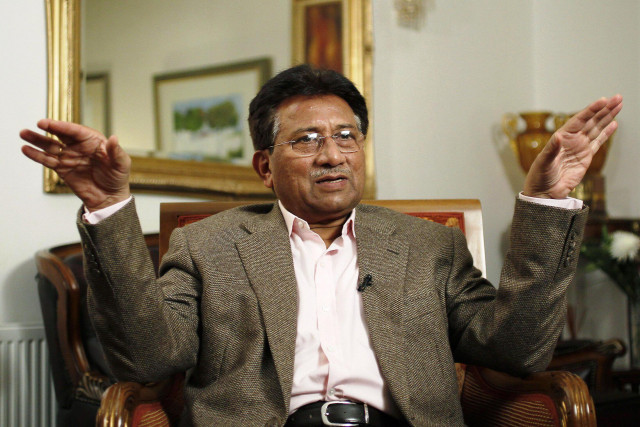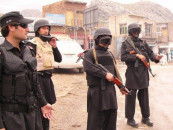Musharraf open to any coalition partners
Musharraf calls MQM a "good party" with whom he has no differences of opinion.

Musharraf open to any coalition partners
Musharraf who is planning to return to contest elections due by 2013 was speaking at his London home during an interview with Reuters.
Musharraf declined to fix a date for a return to Pakistan, which he left after stepping down as president in 2008. But he said he aimed to establish offices for his new political party in all the country's provinces by March.
He launched his All Pakistan Muslim League in London in October. The former military ruler, who could be risking assassination or legal cases if he went home, said he would build up support for his party first. "Obviously I wouldn't be able to pack a suitcase and buy a ticket and reach Islamabad."
"Therefore, while I have decided that I must be there well before the next elections, whether they are mid-term or end-term, the exact date will have to be according to the environment we are able to create."
He said many people had met him or talked over the phone, and that "anyone who wants to join into a coalition is welcome".
Political analysts say he faces an uphill struggle to win enough support, and would need coalition partners from the fragmented opposition to have any chance of success.
Among possible candidates could be smaller parties with whom Musharraf has worked in the past, including the Muttahida Qaumi Movement (MQM), whose leader Altaf Hussain lives in exile in London, and the Pakistan Muslim League-Q (PML-Q).
Musharraf declined to name likely coalition partners, saying he aimed to create a national party. But he said of the MQM: "They are a good party and I have no differences with them." He said he had met with MQM leaders, including Hussain, while many PML-Q politicians were in contact with him.
Asked if he expected support from the army, he said that the military were not supposed to become involved in politics. "However, having said that, I have been in this army for over 40 years ... the troops and the whole army knows me ... I can never even imagine that this army which I have served for 40 years will be against me.
"I am very sure they will be supportive, but if you are meaning active support against other political parties, no, I am not expecting that; it would undermine the whole process."
'Prevent blasphemy law misuse'
Musharraf said, rather than amend the laws, Pakistan needed to find ways to make sure they were not misused. He also condemned the killing of Salmaan Taseer and said it was wrong for anyone to take the law into his own hands.
"Therefore the killer of the governor, he is a culprit, he is a criminal, he must be tried and he must be punished," he said.
He said blasphemy was an extremely sensitive issue for the people of Pakistan. "Therefore doing away with the blasphemy law is not at all possible and must not be done," he told Reuters.
Kashmir roadmap
Musharraf, who has been criticised by Washington for failing to crack down harder on the Taliban when he was in power, said the West had missed a tremendous opportunity to reach a political settlement in Afghanistan in 2002-2004.
But he said there was "some sense" now in talking to the different parts of the Taliban movement, including its leaders. "Any one of them who is for peace, giving up confrontation, I think we should deal with them." But this was not going to be easy since "we are speaking from a position of weakness".
He also said he believed a road map for peace in Kashmir that he agreed with India in 2007 could be revived. "We were in the process of drafting an agreement, obviously there were differences on the wording and the expressions ..." He said it was hard to tell if they were within six months of a deal, "but we were making fast progress, that I know".
However, he also accused India of using its presence in Afghanistan to destabilise Pakistan. Pakistan accuses India of supporting separatists in its Balochistan province, while India accuses Pakistan of backing militant attacks on Indian targets in Kashmir and elsewhere. He said the two countries' intelligence agencies had been in confrontation since independence in 1947.
"This tit-for-tat has been going on over the last 60 years," he said. "I think India and Pakistan need to sit down and stop this confrontation."



















COMMENTS
Comments are moderated and generally will be posted if they are on-topic and not abusive.
For more information, please see our Comments FAQ